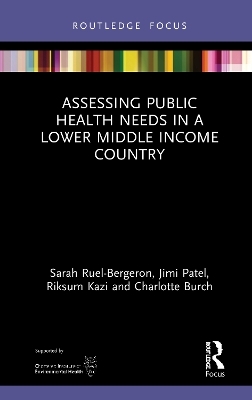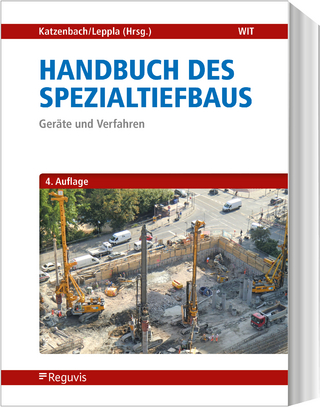
Assessing Public Health Needs in a Lower Middle Income Country
Routledge (Verlag)
9780367530365 (ISBN)
This book demonstrates a methodology for assessing public health needs in communities experiencing environmental sanitation inadequacies. Centring on a case study of the Republic of Cameroon, the findings represent the starting point of a campaign to implement a comprehensive water and sanitation infrastructure through advocacy, housing improvements, and new service chains.
Based on an assessment report undertaken by ARCHIVE Global, an international non-profit organization focusing on the link between health and housing, this book:
Explores and establishes a causal relationship between the built environment and its impacts on public health
Uses the United Nations’ Sustainable Development Goals as a benchmark for highlighting issues and challenges with sanitation infrastructure projects
Provides lessons for communities around the world facing environmental health issues similar to those Cameroon’s Idenau Municipality deals with.
This book is intended for environmental health professionals, academics and policymakers, be they domestic to the African region or multinational practitioners. Donor countries, the likes of the United States and European nations, will also value the book’s advocacy for interventions in the built environment and current public health impacts.
Sarah Ruel-Bergeron, RA, Director of Projects and Development, ARCHIVE Global. Sarah Ruel Bergeron is a licensed architect and the Executive Director at ARCHIVE Global, a non-profit established in 2006 working to combat diseases through interventions to the built environment in vulnerable communities worldwide. She designs, implements, and evaluates projects that operate at the intersection of health and the built environment. Her latest project focused on replacing dirt floors with concrete in Bangladesh to prevent diarrhoeal disease and respiratory and skin infections. Sarah has extensive experience in affordable housing, healthcare architecture, and construction, with a focus on sustainable design, resiliency, and hazard mitigation in vulnerable environments. Jimi Patel, BDS, MPH, Research and Grants Officer, ARCHIVE Global. Jimi Patel graduated with her Master’s degree in Public Health from Long Island University, Brooklyn in May 2017. She also holds a Bachelor’s degree in Dental Surgery from India. Jimi spent a summer in Belgrade, Serbia conducting quantitative and qualitative research on perceptions of health among young adults. She believes in health equity for all and is interested in epidemiology and global health. At ARCHIVE Global, she contributes to projects with her experience in grants, research, and evaluation. Riksum Kazi, Interim Managing Director, ARCHIVE Globlal. Riksum Kazi served as the Interim Mangain Director at ARCHIVE Global. He managed the organization's operations and projects around the world. Riksum graduated Phi Beta Kappa with dual degrees in International Political Economics and History and holds a Master's degree, with distinction, from Columbia University in Political Economics and Regional Affairs. Riksum has worked extensively in South Asia and is an active duty volunteer in the emergency services. Charlotte Burch, Taubman College of Architecture and Urban Planning, University of Michigan. Charlotte Burch is a graduate from Pratt Institute with a Bachelor of Fine Arts in Interior Design and a minor in psychology. She joins ARCHIVE Global with a passion for designing positivelty impactful spaces to help those who need it the most. Throughout her studies, Charlotte has found herself studying in Copenhagen and workung in London. She loves to learn more about the world and all the people in it.At ARCHIVE Global, Charlotte contributed to the research, design, and implementation of projects around the world.
Table of Contents *
Acknowledgements *
Acronyms and Abbreviations *
Foreword *
Letter from Joan Walley *
Introduction *
A Brief History of Idenau, Cameroon *
Chapter 1: Background *
The Community *
The Challenges *
The Priority Areas *
2: Data Collection Methodology *
The Needs Assessment Objectives *
Methodology *
Secondary data collection. *
Chapter 3: Literature Review *
Access to Safe Drinking Water *
Open Defecation and Lack of WASH Infrastructure *
Community-Led Total Sanitation *
Lack of Domestic Waste Management *
Lack of Non-Domestic Waste Management *
Chapter 4: Quantitative Data Analysis Results *
Current Demographics *
Access to Safe Water *
Sanitation and Waste Management *
Health and Hygiene *
Chapter 5: Qualitative Data Analysis Results *
Access to Safe Water *
Waste Management *
Sanitation and Hygiene Behaviours *
Chapter 6: Discussion *
Chapter 7: The UN Sustainable Development Goals (SDGs) *
The United Nations 2030 Agenda for Sustainable Development *
Cameroon - The 2019 SDG Index Score and Rank *
Government Action 2010-2020 *
Cameroon’s Progress in the Implementation of the SDGs *
Chapter 8: Actionable Recommendations *
Pilot phase *
Phase I *
Phase II *
Chapter 9: Opportunities and Barriers in Implementation *
Conclusion *
References *
| Erscheinungsdatum | 05.11.2020 |
|---|---|
| Reihe/Serie | Routledge Focus on Environmental Health |
| Zusatzinfo | 2 Tables, black and white; 3 Halftones, black and white; 3 Illustrations, black and white |
| Verlagsort | London |
| Sprache | englisch |
| Maße | 138 x 216 mm |
| Gewicht | 330 g |
| Themenwelt | Naturwissenschaften ► Geowissenschaften ► Geologie |
| Naturwissenschaften ► Geowissenschaften ► Geophysik | |
| Technik ► Bauwesen | |
| Technik ► Umwelttechnik / Biotechnologie | |
| ISBN-13 | 9780367530365 / 9780367530365 |
| Zustand | Neuware |
| Informationen gemäß Produktsicherheitsverordnung (GPSR) | |
| Haben Sie eine Frage zum Produkt? |
aus dem Bereich


